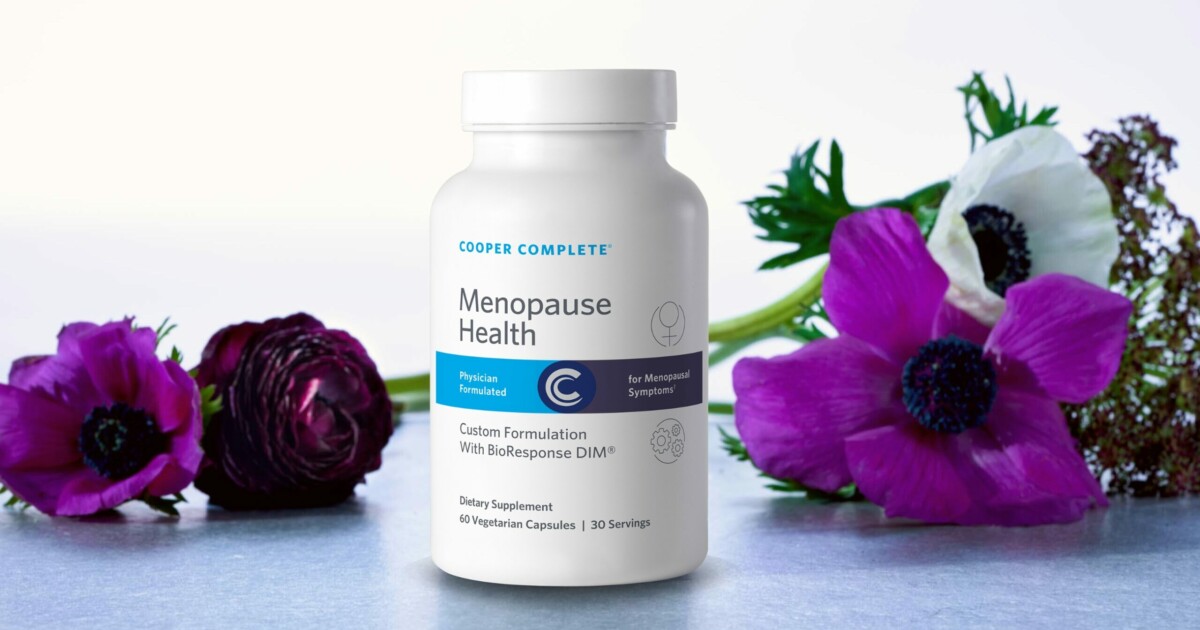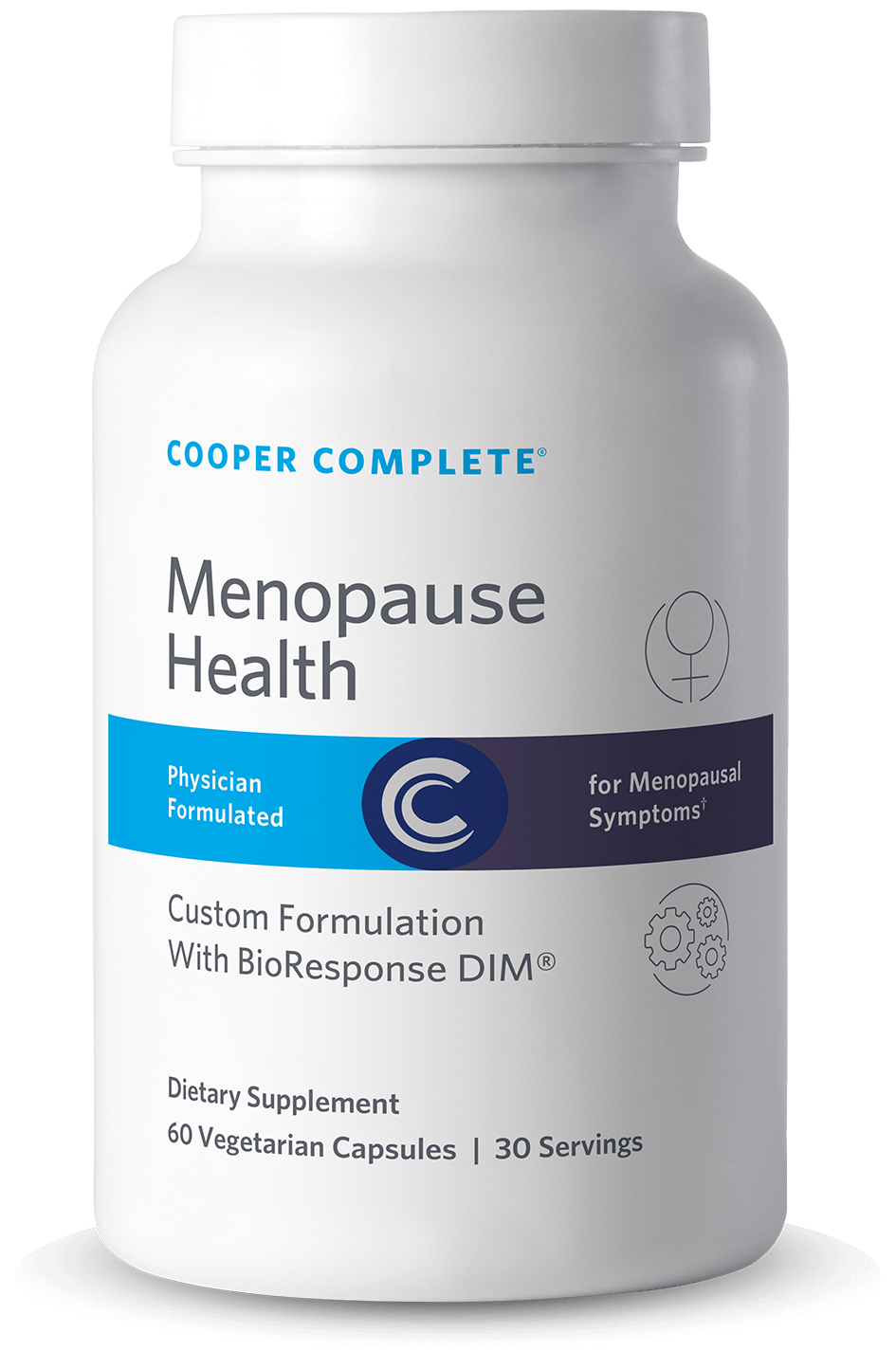Learn About Supplements for the Relief of Menopause Symptoms

The final menstrual period a woman has marks the beginning of menopause and is usually confirmed after there hasn’t been a period for 12 consecutive months (with no other obvious health concerns). Genetics, family history, ethnicity, and lifestyle factors such as physical activity, smoking status, and weight can affect the age of menopause. While the average is age 51, women typically experience natural menopause between ages 40 and 58. The biggest predictor of menopause onset is the age our mother entered menopause. (Interestingly, a cross-sectional survey of 22,484 women conducted in the U.S. found geographic age variations. Southern women reported menopause 10.8 months earlier than Northeastern women, 8.4 months earlier than Midwestern women, and 6 months earlier than Western women.)
Physical changes leading up to the final menstrual period typically begin 4 to 8 years earlier. This transition phase is perimenopause. Perimenopause begins with irregular menstrual cycles and last one year after the last menstrual period. Menopause happens because a woman’s ovaries stop producing the hormones estrogen and progesterone. Irregular menstrual periods may be the only change some women experience during perimenopause. However, more than 60 percent of North American women experience other menopause symptoms as estrogen and other hormone levels decline.
Women experience menopause symptoms differently. These are common perimenopause signs and symptoms:
Hot Flashes
Hot flashes in menopause are a vasomotor response to a lack of estrogen. A hot flash is the body’s way to cool itself. Some women simply feel suddenly warm, while others feel intense heat. Hot flashes are typically felt and seen as redness of the upper face, neck, and torso created by the widening of the blood vessels, increased skin temperature, and increased blood flow. Of menopause symptoms, hot flashes are the most common. About 75 percent of women experience hot flashes during this time. Most women experience hot flashes for up to about two years, but some women have them much longer.

Menopause Health Supplement
Custom-formulated to assist women in getting restful and rejuvenating sleep by addressing symptoms of anxiety, restlessness, and night sweats.†
$43.48 Add to cartDisrupted Sleep
Some women find they simply have more difficulty getting a good night’s sleep during this time of life. While sleep hygiene can improve sleep quality, dietary supplements may also help.
Night Sweats
About two-thirds of women experience hot flashes and/or night sweats caused by the drop in estrogen levels. Night sweats happen when hot flashes occur during sleep, and heavy sweating wets sleepwear and bedding that awakens the sleeper.
Mood and Thinking Changes
With perimenopause, established hormonal rhythms are disrupted. Premenopausal women often complain of increased irritability, depression, and new difficulties in thinking. Changes may be attributed to changing hormonal rhythms and/or lack of sleep due to night sweats. However, midlife is a stressful time for women, and balancing aging parents, children, careers, and relationships may be contributing factors.
Vaginal Dryness
As estrogen and other hormone levels decline, vaginal tissues may become thinner and dry, causing discomfort, pain, burning, or soreness.
The North American Menopause Society, the American Society for Reproductive Medicine, and The Endocrine Society agree that most healthy, recently menopausal women can use hormone replacement therapy (HRT) and other prescription medications for relief of menopausal symptoms. Hormone replacement therapy is the gold standard for the treatment of menopause symptoms. However, each woman’s health is unique, and prescription medications may not be appropriate or preferred for all women.
Cooper Complete Menopause Health is a soy-free supplement specifically formulated with magnesium and a proprietary blend of herbs. Cooper Complete Menopause Health is designed to support normal perimenopause and menopausal symptoms and healthy estrogen levels in women†.
Passion Flower (passiflora incarnata)(aerial part)
This climbing vine with white and purple flowers has been used since the 16th century to treat anxiety and sleep. Researchers believe that passionflower supplements may work by increasing levels of gamma-aminobutyric acid (GABA), a chemical the brain makes to help regulate mood.
A pilot double-blind randomized controlled trial with 36 adults diagnosed with generalized anxiety disorder found no significant differences in anxiety between the subjects who took oxazepam (brand name Serax, a benzodiazepine) and those who took passionflower. In addition, the participants who took passionflower had few issues with job performance compared to the participants who took oxazepam.†
In another study, participants who took passion flower experienced a significant reduction in menopause symptoms including headaches, depression, insomnia, and anger, compared to the control group.
Black Cohosh (Actaea racemosa) (root)
Although black cohosh, a flowering perennial plant native to North America, can grow to 10 feet tall, only the roots and rhizomes (underground stems) of the plant are used in supplements. Researchers aren’t sure which compounds in black cohosh are beneficial but suspect synergistic activity of phytoestrogens and triterpenes compounds in this herb. Triterpene glycosides found in black cohosh extract act synergistically with phytoestrogens to suppress the excessive secretion of luteinizing hormone (LH).
LH is a hormone produced in the pituitary gland and helps control the menstrual cycle. It triggers the release of an egg from the ovary. An LH blood test helps confirm the start of menopause. It is thought sudden increases in LH secretion, which occur in response to declining estrogen levels, may be responsible for many symptoms associated with menopause.
Researchers have studied the effectiveness of black cohosh in relieving menopausal symptoms for decades, and the evidence suggests black cohosh is safe and effective at reducing menopausal symptoms, primarily hot flashes and possibly mood disorders. Black cohosh is widely used in Europe and is approved in Germany for premenstrual discomfort, painful menstruation and menopausal symptoms.
In an open-label trial studying black cohosh, 80 percent of the 629 subjects reported fewer menopausal complaints after 4 weeks, and 50 percent reported a complete disappearance of symptoms within 6-8 weeks. Studies have also shown black cohosh supports emotional well-being by promoting a sense of calmness, along with a positive mental outlook.
Lemon Balm (Melissa officinalis) (leaf)
Although called lemon balm, it is not related to lemon or lemongrass. A member of the mint family, this herb gets its name from its lemon scent.
It has been used since the Middle Ages to reduce stress and anxiety, promote sleep and relief for indigestion discomfort. Anxiety and sleep issues are common during menopause. A meta-analysis of randomized controlled trials in adults with depression and/or anxiety shows that using lemon balm significantly improved mean anxiety and depression scores compared with placebo.
Magnesium
Migraine sufferers are predominately female, with women 70 percent of migraine sufferers. Some evidence suggests hormonal migraines are caused by changing estrogen levels. Daily magnesium supplementation has been shown to be effective in preventing menstrually-related migraines, especially in women who suffer premenstrual migraines.
The Institute of Medicine recommends adult women ingest 320 mg of magnesium per day. While magnesium is in many foods (the richest food sources of magnesium are nuts, legumes, dairy and some fish), it is estimated more than 60 percent of US adult women consume less than 230 mg per day of magnesium. Cooper Complete Menopause Health contains 100 mg of magnesium to augment the average magnesium received in food. (Cooper Complete Basic One Multivitamin formulations contain 200 mg magnesium.)
Bonus Content
Cooper Fitness Center Professional Trainer Angela Horner shares exercise tips for women in menopause.

